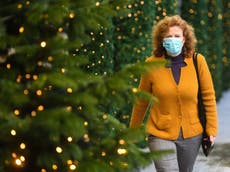Coronavirus: Families ‘could be allowed to mix for a week over Christmas’
Several families could be allowed to mix in bubble between 22 and 28 December, reports say
Your support helps us to tell the story
This election is still a dead heat, according to most polls. In a fight with such wafer-thin margins, we need reporters on the ground talking to the people Trump and Harris are courting. Your support allows us to keep sending journalists to the story.
The Independent is trusted by 27 million Americans from across the entire political spectrum every month. Unlike many other quality news outlets, we choose not to lock you out of our reporting and analysis with paywalls. But quality journalism must still be paid for.
Help us keep bring these critical stories to light. Your support makes all the difference.
Coronavirus rules could be relaxed to allow families to meet up for one week over Christmas, according to reports.
Health secretary Matt Hancock told a Downing Street briefing it was too early to say what contact different households might be allowed to have over the festive period – but reports claim Boris Johnson is preparing to announce a plan next week for an easing of restrictions.
Several families could be allowed to join a bubble and to mix between 22 and 28 December, the Daily Telegraph reported.
The newspaper said the prime minister will also warn the level of restrictions for the rest of next month would depend on how well the public obeys the current lockdown in England, which is due to end on 2 December.
Downing Street declined to comment, but did not deny the report.
Addressing the coronavirus briefing on Friday, Mr Hancock said it would be a "boost" for the UK if a "safe, careful and sensible" set of plans could be agreed between the devolved nations.
He added: "Over Christmas I know how important it is that we have a system in place, a set of rules that both keeps people safe but also allows people to see their loved ones."
Earlier this week Public Health England said Scientific Advisory Group for Emergencies (Sage) guidance had suggested each day of greater freedom could require five days of tighter measures.
But Professor Jonathan Van-Tam, deputy chief medical officer for England, said there was "no magic number" when it came to how many days any easing of the rules might cost.
Mr Hancock said the second peak of the virus is "flattening" but urged the public to "keep our resolve" for the rest of the lockdown to keep cases down.
Warning that infection rates will pick up again if the public ignores any guidelines put in place around Christmas, Prof Van-Tam said there was a "dual responsibility" for people to follow the rules set out by the government.
Welsh first minister Mark Drakeford said he was "generally hopeful" an agreement can be reached between the UK's four nations regarding Christmas plans.
He said issues being discussed included travel between the nations, how long any easing of restrictions might last and to what extent households may be allowed to mix, and that further talks were due to take place next week.
Mr Hancock said he was also becoming “more and more confident” of life returning to some kind of normality by spring as he confirmed the UK's health regulator is assessing a coronavirus vaccine.
If the Pfizer/BioNTech vaccine is approved, vaccinations could begin next month with the “bulk” of the roll out following in the new year.
It comes as NHS documents seen by the Health Service Journal (HSJ) suggest all adults in England - of any age - could start to be vaccinated against Covid-19 before the end of January if supplies allow.
Under the plan, every adult who wants a jab could be vaccinated by early April.
The government said a further 511 people had died within 28 days of testing positive for Covid-19 as of Friday, bringing the UK total to 54,286, while another 20,252 lab-confirmed cases of coronavirus were reported.
On Friday, the Office for National Statistics (ONS) said there were "substantial differences" in Covid-19 infection rates across England, with rates having continued to increase in London, the east of England and the South East, but decreasing in the North West and the East Midlands.
Sage said the reproduction number - or R value - for the whole of the UK had dropped to between 1 and 1.1.
Additional reporting by PA
Subscribe to Independent Premium to bookmark this article
Want to bookmark your favourite articles and stories to read or reference later? Start your Independent Premium subscription today.





Join our commenting forum
Join thought-provoking conversations, follow other Independent readers and see their replies
Comments